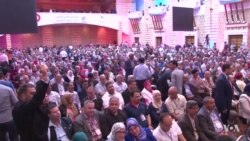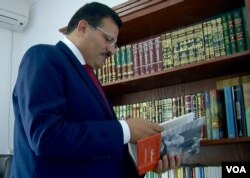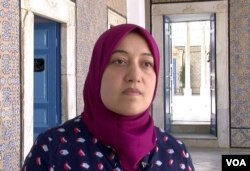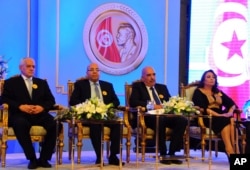The Ennahda party's sleek Tunis headquarters is a cool oasis for the stream of visitors coming to pay calls and seek favors on a recent steamy morning.
The visitors are settled into comfortable couches and handed large cups of cappuccino as they wait. Foreigners are greeted in fluent French or English by staff who spent years in exile.
Since Tunisia’s revolution five years ago, the moderate Islamist party has been on a roller-coaster ride, soaring from pre-revolutionary lows as political pariah to, at least briefly, the pinnacle of power.
Now Ennahda — whose name means renaissance in Arabic — appears to be starting a new chapter in its history, as it moves to separate its political and religious activities.
Overwhelmingly endorsed at a party conference in last week, party members describe the split as a pragmatic response to the political and economic challenges facing Tunisia today.
“It means that Ennahda is a civic party with an Islamic background - but it is like any other political political party in a democratic country,” says Ennahda’s external affairs chief Rafik Abdessalem, an ex-foreign minister and the son-in-law of party leader Rachid Ghannouchi. “It will allow us to respond better to the demands of the people, in terms of quality of life, jobs for the young, better health and education."
Mixed opinions
Not everyone agrees. In a country deeply divided over the role of political Islam and fearful of mounting extremism, opinions are mixed about Ennahda’s latest metamorphosis.
Some observers greet the change cautiously, waiting to see how it will pan out in practical terms. Sharper critics dismiss it as mere rhetoric, while Ennahda hardliners consider it a betrayal of the party’s religious identity.
“There’s no such thing as ‘Islam light,’” says 55-year-old taxi driver Samir Sassi.
Supporters say Ennahda’s rebranding affirms the party as a purely Tunisian product, putting distance from Egypt’s Muslim Brotherhood, from which it once drew support and inspiration.
Some draw references instead to parties like Germany’s Christian Democrats, inspired but not ruled by their religious heritage.
“Yes, there is something you can call Muslim democracy,” says Ennahda lawmaker Sayida Ounissi, who believes Ennahda’s model is exportable, “and we’re keen to prove it.”
Some analysts believe the move will help Ennahda broaden its membership, even if it loses more conservative supporters.
“I see this as mainly about messaging,” Tunisian specialist Monica Marks told The Financial Times. “They don’t want to be lumped into the same category as al-Qaida and Boko Haram. They want to be more like the Christian Democratic Party in Germany, or the AKP in its early version in Turkey.”
Political survivor
If nothing else, the move reinforces Ennahda's reputation as an adept political survivor since its founding in 1981. Under former Tunisian president Zine el-Abidine Ben Ali, the party was barred from politics and senior members were sent to prison or exile.
They returned in the weeks following Tunisia’s 2011 revolution, going on to win the country’s first democratic elections.
While in power, Ennahda was criticized for failing to turn around the ailing economy and fight mounting extremism and insecurity. Unlike Egypt’s Muslim Brotherhood, it fell by the ballot in 2014.
Ennahda has since rebounded to become a key member in a governing coalition with its secular rival Nidaa Tounes. And with the secularists divided by infighting, it has recently emerged as the largest block in parliament.
Tunisian trade leader Wided Bouchamaoui, one of last year’s Nobel Peace laureates, says she hoped Ennahda will deliver on its latest promise.
“We need to separate between religion and politics,” she adds. “We need to be like other countries, but also be proud about our religion.”
College freshman Ahlem Ferjani dismisses Ennahda’s rebranding as superficial.
“They’re really backwards,” she says. “They don’t look to the future.”
Other Tunisians, worried about the country’s battered economy and pessimistic about the future, are more interested in results.
“These days, I go to the cafe, I do my errands, I go home,” says unemployed 65-year-old Gazi Belrejeb.
“For me, it makes no difference it it’s Ennahda or Nidaa Tounes,” he adds. “I want a party that can make the economy work.”









